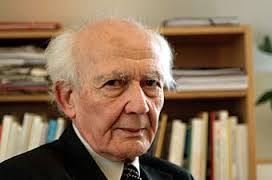Lessons in Liquid Societies

Godward faith and human reason have been wrestling with each other for millennia. Which of these philosophies will ultimately lead humanity to its evolutionary finale? Are we getting better and better as a species, as created beings. Or are we devolving with time and with the unfolding of modernity? Zygmunt Bauman writes expertly in this week’s reading on these big questions. I was both challenged and intrigued by this text.[1] Where are we going, as a global society – particularly in Western, “developed” nations – but also in “developing” nations? How does what is happening in the wealthy nations affect what is happening to the poorer nations?
Bauman paints our world in twenty-first century terminology and statistics to bolster his argument that we are living in insecure times, fraught with unfathomable poverty, arrogant class distinctions, fear, and vulnerability. In Chapter 1, Bauman writes of freedom and democracy:
The fate of freedom and democracy in each land is decided and settled on the global stage; and only on that stage can it be defended with a realistic chance of lasting success. It is no longer in the power of any singly acting state, however resourceful, heavily armed, resolute and uncompromising, to defend chosen values at home while turning its back on the dreams and yearnings of those outside its borders. But turning our backs is precisely what we, the Europeans and Americans, seem to be doing, when keeping our riches and multiplying them at the expense of the poor outside.[2]
Bauman continues:
At its earlier stage, modernity raised human integration to the level of nations. Before it finishes its job, however, modernity needs to perform one more task, one that is yet more formidable: to raise human integration to the level of humanity, inclusive of the whole population of the planet. However hard and thorny that task may prove to be, it is imperative and urgent, because for a planet of universal interdependency it is, literally, a matter of (shared) life or (joint) death.[3]
Bauman takes us through some very honest political history. He compares and contrasts Marxism and Capitalism, painting both as oppressive, uncaring systems. Bauman points out that all modern societal systems create great insecurity and uncertainty for the average person, even more so for the “classless,” the “have-nots” who have little hope for the future. He points out, as well, that in much of the world, “the other” is more and more marginalized from the majority of the consumer-oriented societies. Then he slams hard his concept of how consumerism and morality do not mix[4]. This chapter alone was worth the price of the book.
Although this text is highly academic, there are sections when Bauman nails the truths of the modern, liquid society in which we live. He reminds us that most of us have failed to focus on what is important in life:
Most of us are overwhelmed with worries arising from our daily relations with bosses, workmates or clients, and most of us take those worries with us, in our laptops and mobile phones, wherever we go – to our homes, for weekend strolls, in holiday hotels; we are never further than a phone call or a phone message from the office, constantly at people’s beck and call.[5]
I so identified with this commentary. It really got me thinking.

I was teaching a new EN 200 – Advanced Composition course last week and, as they often do, my students taught me some very important lessons. I was talking about the fact that everything around us is crying out for our attention and that everything (especially in our consumeristic society) makes some kind of claim. It could be a claim of fact, a claim of value, a proposal, or some other type of claim. I brought several objects from home that made simple claims: a cap from my daughter’s medical school, a small sculpture of a husband and wife on their wedding day, and some advertisements. We had a good discussion about the possible claims that these objects and advertisements made. The final object I brought was a homemade gift given to me this Christmas by my 31-year-old son. The gift was a small bag that contained three handmade coupons. The first coupon was for a free car detail – cool! The other two coupons were for two one-hour backrubs – amazing! I began to wax eloquently on what I felt this gift was claiming. I said that this was a hard financial year for my son, so he gave me this gift,. And then one of my students gave another possible claim. “Professor Bill, maybe your son wants to spend some time with you.” I stood there in class speechless. My student was right. I have assumed that my adult son doesn’t need to spend time with his dad. This is an untrue assumption; it is a logical fallacy.
I am too busy (even though I know I am too busy.) I know that I am supposed to live by priorities (but I often don’t). There are so many things that I want to do that I do not do, important things – relational things. But I let time go on – and on it goes. I am privileged. I have a full-time job. I live in a nice home. I certainly eat well (too well). I am educated. I have a wonderful family. The list goes on. But how am I impacting those closest to me? And how am I impacting this sinking world?
I am grateful for our reading this week. Although I waded through it in the early hours of several mornings, did not understand every word, and was tempted to quit, I am glad made it through. God help me to internalize the message of this text and to live it out daily, even if it is only making a small difference.
Leave a Reply
You must be logged in to post a comment.